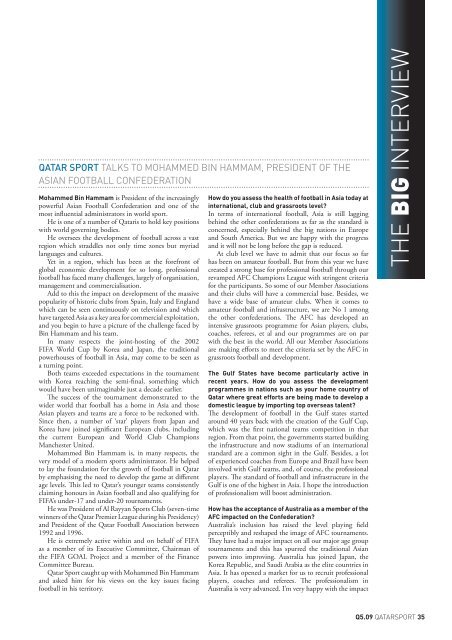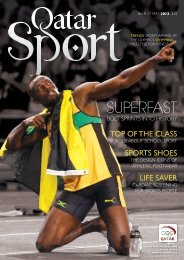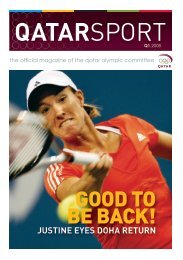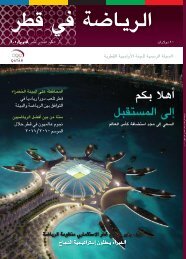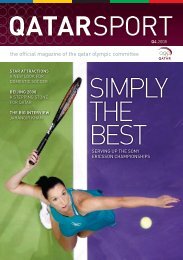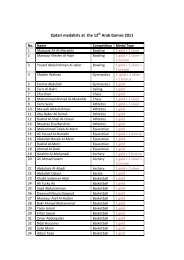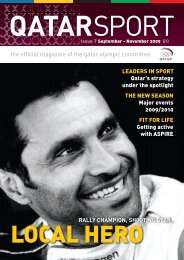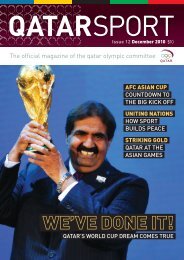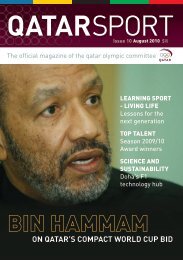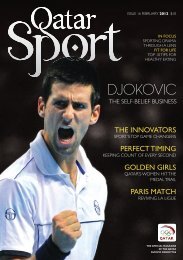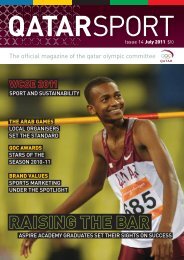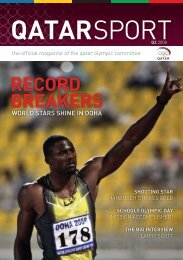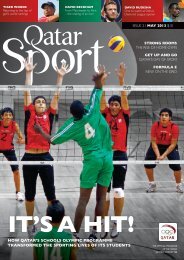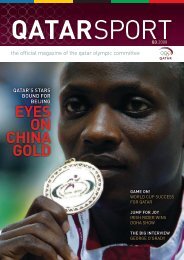Create successful ePaper yourself
Turn your PDF publications into a flip-book with our unique Google optimized e-Paper software.
<strong>Qatar</strong> Sport talks to MohaMMed Bin haMMaM, President of the<br />
asian footBall Confederation<br />
Mohammed Bin Hammam is President of the increasingly<br />
powerful Asian Football Confederation and one of the<br />
most influential administrators in world sport.<br />
He is one of a number of <strong>Qatar</strong>is to hold key positions<br />
with world governing bodies.<br />
He oversees the development of football across a vast<br />
region which straddles not only time zones but myriad<br />
languages and cultures.<br />
Yet in a region, which has been at the forefront of<br />
global economic development for so long, professional<br />
football has faced many challenges, largely of organisation,<br />
management and commercialisation.<br />
Add to this the impact on development of the massive<br />
popularity of historic clubs from Spain, Italy and England<br />
which can be seen continuously on television and which<br />
have targeted Asia as a key area for commercial exploitation,<br />
and you begin to have a picture of the challenge faced by<br />
Bin Hammam and his team.<br />
In many respects the joint-hosting of the 2002<br />
FIFA World Cup by Korea and Japan, the traditional<br />
powerhouses of football in Asia, may come to be seen as<br />
a turning point.<br />
Both teams exceeded expectations in the tournament<br />
with Korea reaching the semi-final, something which<br />
would have been unimaginable just a decade earlier.<br />
The success of the tournament demonstrated to the<br />
wider world that football has a home in Asia and those<br />
Asian players and teams are a force to be reckoned with.<br />
Since then, a number of ‘star’ players from Japan and<br />
Korea have joined significant European clubs, including<br />
the current European and World Club Champions<br />
Manchester United.<br />
Mohammed Bin Hammam is, in many respects, the<br />
very model of a modern sports administrator. He helped<br />
to lay the foundation for the growth of football in <strong>Qatar</strong><br />
by emphasising the need to develop the game at different<br />
age levels. This led to <strong>Qatar</strong>’s younger teams consistently<br />
claiming honours in Asian football and also qualifying for<br />
FIFA’s under-17 and under-20 tournaments.<br />
He was President of Al Rayyan Sports Club (seven-time<br />
winners of the <strong>Qatar</strong> Premier League during his Presidency)<br />
and President of the <strong>Qatar</strong> Football Association between<br />
1992 and 1996.<br />
He is extremely active within and on behalf of FIFA<br />
as a member of its Executive <strong>Committee</strong>, Chairman of<br />
the FIFA GOAL Project and a member of the Finance<br />
<strong>Committee</strong> Bureau.<br />
<strong>Qatar</strong> Sport caught up with Mohammed Bin Hammam<br />
and asked him for his views on the key issues facing<br />
football in his territory.<br />
How do you assess the health of football in Asia today at<br />
international, club and grassroots level?<br />
In terms of international football, Asia is still lagging<br />
behind the other confederations as far as the standard is<br />
concerned, especially behind the big nations in Europe<br />
and South America. But we are happy with the progress<br />
and it will not be long before the gap is reduced.<br />
At club level we have to admit that our focus so far<br />
has been on amateur football. But from this year we have<br />
created a strong base for professional football through our<br />
revamped AFC Champions League with stringent criteria<br />
for the participants. So some of our Member Associations<br />
and their clubs will have a commercial base. Besides, we<br />
have a wide base of amateur clubs. When it comes to<br />
amateur football and infrastructure, we are No 1 among<br />
the other confederations. The AFC has developed an<br />
intensive grassroots programme for Asian players, clubs,<br />
coaches, referees, et al and our programmes are on par<br />
with the best in the world. All our Member Associations<br />
are making efforts to meet the criteria set by the AFC in<br />
grassroots football and development.<br />
The Gulf States have become particularly active in<br />
recent years. How do you assess the development<br />
programmes in nations such as your home country of<br />
<strong>Qatar</strong> where great efforts are being made to develop a<br />
domestic league by importing top overseas talent?<br />
The development of football in the Gulf states started<br />
around 40 years back with the creation of the Gulf Cup,<br />
which was the first national teams competition in that<br />
region. From that point, the governments started building<br />
the infrastructure and now stadiums of an international<br />
standard are a common sight in the Gulf. Besides, a lot<br />
of experienced coaches from Europe and Brazil have been<br />
involved with Gulf teams, and, of course, the professional<br />
players. The standard of football and infrastructure in the<br />
Gulf is one of the highest in Asia. I hope the introduction<br />
of professionalism will boost administration.<br />
How has the acceptance of Australia as a member of the<br />
AFC impacted on the Confederation?<br />
Australia’s inclusion has raised the level playing field<br />
perceptibly and reshaped the image of AFC tournaments.<br />
They have had a major impact on all our major age group<br />
tournaments and this has spurred the traditional Asian<br />
powers into improving. Australia has joined Japan, the<br />
Korea Republic, and Saudi Arabia as the elite countries in<br />
Asia. It has opened a market for us to recruit professional<br />
players, coaches and referees. The professionalism in<br />
Australia is very advanced. I’m very happy with the impact<br />
the big interview<br />
Q5.09 <strong>Qatar</strong>Sport 35


